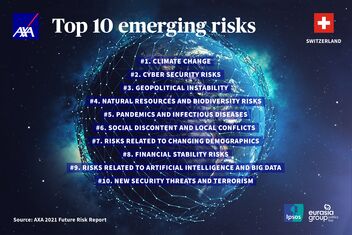
AXA Future Risks Report 2021: Switzerland at ease
AXA has published its eighth annual Future Risks Report. Whereas the coronavirus pandemic was the dominant risk in 2020, climate change has moved back into first place worldwide this year. Swiss people, however, are less unsettled by the imminent risks and have faith in their institutions.
AXA has once again surveyed more than 23,000 risk experts and members of the general public around the globe to find out their opinions on future risks. The pandemic still looms large, even though climate change has regained its position as the leading risk globally. Over 70% of respondents are worried about future health risks and their consequences, but the level of concern differs from region to region. Pandemics and infectious diseases remain the biggest source of worry in Asia, the Middle East, and Africa, but they have fallen to third place in Europe and America, where people who took part in the survey see climate change as the biggest risk they face – as was the case in the years before the pandemic. These concerns are especially pronounced in Europe, whereas cyber security risks were seen as the greatest threat in America for the first time.
Switzerland less concerned
Fears over cyber security have also risen in Switzerland over the past few years, and this trend has accelerated in view of the growing frequency of cyber attacks since the pandemic began, pushing cyber security risks into second place behind climate change. The surveyed experts in particular see them as a significant threat, whereas the Swiss population in general is still more concerned about the pandemic, albeit less so compared with other countries: on average, Swiss people are the least worried about health risks worldwide. The same applies to climate change. While the overall level of concern is higher in Switzerland than some other regions, it is not as high as in the neighboring European countries. The Swiss also appear less preoccupied by other future risks for both their own country and the world as a whole. Their faith in Switzerland's institutions is probably one reason for this more positive outlook. Almost three quarters of respondents – much more than the global average – believe that their national public institutions will help to solve the problems arising from future risks.
Faith in globalization waning
Those taking part in the survey were also asked for their views on the continuing trend toward globalization. Some 54% see a positive impact from the increasingly networked global economy and believe that it will bring benefits for the world's population over the long term. The Swiss participants are exactly in line with the global average in this respect, although that was a full seven percentage points higher a year ago. This means that more people are now taking a critical view of globalization and see more negative effects than they did 12 months ago.
Nevertheless, a majority (55%) are convinced that the potential future threats must be addressed at the global level. At the continental level, trust is at 13%, considerably lower than for the individual countries, which 26% of respondents believe must be prepared to act on future risks.
Further information
The AXA Future Risks Report enters its eighth year in 2021. The global study gauges changes in the perception of emerging risks and ranks these risks. A survey of more than 23,000 risk management experts and members of the general public worldwide was conducted in collaboration with the market research firm Ipsos and the political risk consultancy Eurasia Group.





